King - playing card
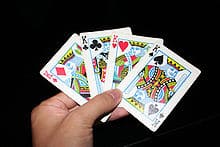
King cards of all four suits in the Rouennais pattern
The king is a playing card with a picture of a king on it. The king is usually the highest-ranking face card. In French playing cards and tarot decks, the king immediately outranks the queen. In Italian and Spanish playing cards, the king immediately outranks the knight. In German and Swiss playing cards, the king immediately outranks the Ober. In some games, the king is the highest-ranked card; in others, the ace is higher. In pinochle, schnapsen, and many other European games, both the ace and the 10 rank higher than the king.
The king card is the oldest and most universal court card. It descends directly from the Mamluk king card where it outranked the viceroy card.
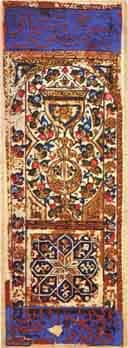
Mamluk King of Cups c. 1500
In a French deck, the court cards do have names. Because the manufacture of playing cards was illegal in England during the Interregnum, when the English Restoration came and the court began playing card games, the suits in an English deck came from the French deck, but without all of the lore. For a period, starting in the 15th century, French playing-card manufacturers assigned to each of the court cards names taken from history or mythology. The names inscribed on these cards still appear on 32-card decks in France. The names for the kings in the French national pattern (Parisian or portrait officiel) are:
| Cards |
Names |
Notes |
|
|
David |
A biblical king |
|
|
Charles (presumably after Charlemagne) |
King of Francia and the first Holy Roman Emperor |
|
|
Caesar (presumably after Julius Caesar) |
Dictator of the Roman Republic |
|
|
Alexander |
King of Macedonia and ruler of one of the largest empires of the ancient world |
In many card games, when all four kings are acquired by a single player, they are commonly called "the four horsemen".
King of clubs
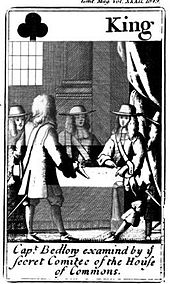
King of Clubs from a deck of Popish Plot cards
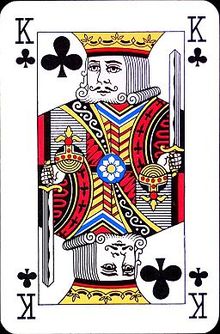
King of Clubs (Rouennais pattern)
In cartomancy, the King of clubs has the meaning of good character and loyalty and the realization of ideals. The card is said to be one who has great power, but one who is not aware of this, and is outwardly cheerful but inwardly reserved.
The King of clubs is said to have a natural affinity for the Queen of diamonds.
King of spades
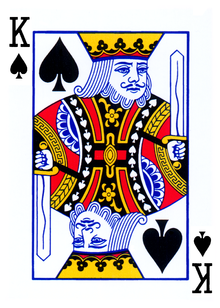
King of Spades (Rouennais pattern)
In the French national pattern, the King of Spades is the Biblical King David. The suit of spades means "swords" from the Italian spada and the sword which he holds is that of Goliath, whom David slew. The king is holding a harp, as the Bible attributes many of the psalms to David.
In cartomancy, the King of Spades reversed is viewed as a dishonest lawyer. He is a stern law giver who is not easily swayed by emotion. It is representative of a dark haired person who is intelligent and authoritative in judgment, and is not easy to get along with.
King of hearts

Evolution of the King of Hearts in the Rouennais pattern
In the Rouennais pattern, the king of hearts is sometimes called the "suicide king" because he appears to be sticking his sword into his head. This is a result of centuries of bad copying by English card makers where the king's axe head has disappeared. The king of hearts is the only one of the kings without a mustache.
King of diamonds
In cartomancy, the king of diamonds represents Caesar (presumably after Julius Caesar) - Dictator of the Roman Republic. The king of diamonds is different from the three other kings, appearing in profile with a single eye visible. The king of diamonds is also commonly known as king of dices.
Example cards
Kings from French playing cards:
-

King of Clubs (Russian pattern)
-

King of Diamonds (Russian pattern)
-

King of Hearts (Russian pattern)
-

King of Spades (Russian pattern)
-

Berlin pattern
-

Industrie und Glück pattern
Kings from Italian playing cards:
-

King of Clubs (Bergamo pattern)
-

King of Coins (Bergamo pattern)
-

King of Cups (Bergamo pattern)
-

King of Swords (Bergamo pattern)
Kings from Spanish playing cards:
-

Catalan pattern
-

Castilian pattern
Kings from German playing cards:
-

King of Acorns (Saxon pattern)
-

King of Bells (Saxon pattern)
-

King of Hearts (Saxon pattern)
-

King of Leaves (Saxon pattern)
Read more:
- List of poker hand nicknames
- The King of Hearts, a character from Lewis Carroll's Alice's Adventures in Wonderland
- King of Clubs, Paul Gilbert's 1998 album
- King of Hearts (musical) is a 1978 musical, based on the 1966 anti-war cult film.
- King of Clubs, a golf-based video game
- King of Hearts, a 1936 film directed by Oswald Mitchell and Walter Tennyson
- King of Hearts, also known as Le Roi de coeur, a 1966 French film directed by Philippe de Broca
- King of Hearts, the title used by Domon Kasshu and Master Asia in the 1994 anime Mobile Fighter G Gundam
- King of Hearts, a 1992 album by Roy Orbison
- Eddie Kingston, a professional wrestler who goes by the nickname "The King of Diamonds."
COMMENTS








 King cards of all four suits in the Rouennais pattern
King cards of all four suits in the Rouennais pattern Mamluk King of Cups c. 1500
Mamluk King of Cups c. 1500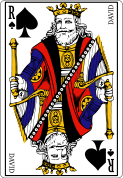
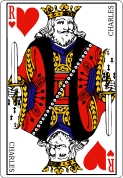
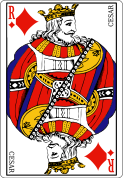
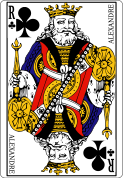
 King of Clubs from a deck of Popish Plot cards
King of Clubs from a deck of Popish Plot cards King of Clubs (Rouennais pattern)
King of Clubs (Rouennais pattern) King of Spades (Rouennais pattern)
King of Spades (Rouennais pattern) Evolution of the King of Hearts in the Rouennais pattern
Evolution of the King of Hearts in the Rouennais pattern














